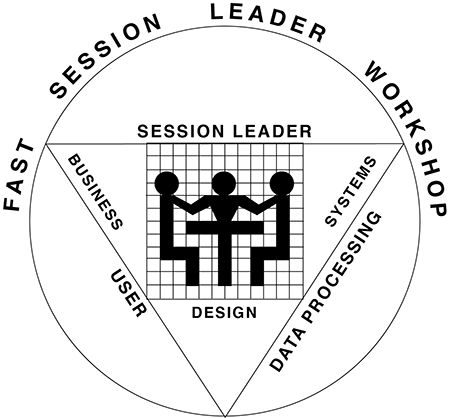April 2002

Building a Process | Gary Rush Facilitation
A major responsibility of a facilitator is to develop and conduct the most effective process possible for each workshop. Many times, this is accomplished by following "cookbook" agendas. These are workshop agendas that have been used before and are tested. Other times, the facilitator works with an expert in a given method (I call this person a "methodologist") to develop a workshop agenda based on the method. Both of these means of developing a workshop agenda work very well and cover the majority of situations. Cookbook agendas and working with a methodologist are the most effective ways to develop agendas.
However, not all situations fit into a cookbook agenda or have a methodologist to help. In those cases, the facilitator must develop the process another way. Following is a way that I use to develop new methods that lead to workshop agendas.
This method is based on a problem-solving agenda called the "Single Question" approach. It begins with a single question. This single question is the overriding reason for the workshop.
Example: A workshop to design a newsletter would begin with the single question, "What is the content and format of this newsletter?"
Once the single question is clear, I then begin listing the sub-questions - those that need to be answered in order to answer the single question.
Example: Our newsletter workshop question can be answered when the following sub-questions are answered:
- Who is the newsletter audience?
- What is the purpose of the newsletter?
- What are their interests?
- Why would they read a newsletter?
- What do they already know?
- What do they want to know?
- Which media would they prefer?
To ensure that you have a complete list of sub-questions, talk to the person requesting the workshop. Talk to the participants. Find out what questions they have. Test your questions to see if they are complete.
Once I have a complete list of sub-questions, I then sequence them in order - which need to be answered first, second, and so on. This begins to develop a process - remember, facilitators provide a process not just a laundry list of questions. The order is based on which answers help in answering subsequent questions.
Example: For our newsletter, the questions need to be answered in the following order:
- What is the purpose of the newsletter?
- Who is the newsletter audience?
- Why would they read a newsletter?
- What are their interests?
- What do they want to know?
- What do they already know?
- Which media would they prefer?
Now, we need to group the questions. We could just leave them as is and step through the question in this order, but it doesn't clearly provide us with end points or deliverables. Participants participate better when we "chunk" information to create natural breaks. Group the questions so that a single, definable product is developed at the end of each set of questions - or question.
Example: In our newsletter example, we have four key products: Overall Purpose, Audience, Content, and Media. Question 1 defines the Overall Purpose. Questions 2 and 3 define the Audience. Questions 4, 5, and 6 define the Content. Question 7 defines the Media.
Once the questions are grouped and the products defined, you almost have an agenda. Complete the agenda by adding the introduction and wrap-up.
Example: Our newsletter workshop agenda would be:
- Introduction
- Define the Purpose
- Define the Audience
- Who is the audience?
- Why would they read it?
- Define the Content
- What are their interests?
- What do they want to know?
- What do they already know?
- Describe the Media
- Review and Wrap up
Summary
So, the way to develop a process is:
- What is the single question that the workshop must answer?
- What are the sub-questions?
- What is their sequence?
- Group them to define products.
- What’s the final agenda?
This fairly simple process works in many situations. Give it a try - it helps you develop effective workshop processes. ![]()

